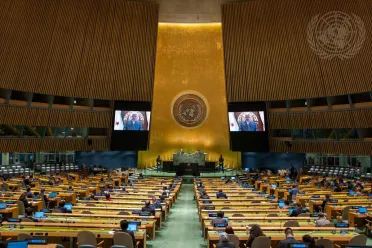Statement
Statement summary
ISMAËL OMAR GUELLEH, President of Djibouti, underscored the pandemic’s ongoing impact, particularly on the poor and the vulnerable. It has called into question progress towards the Sustainable Development Goals and aggravated extreme poverty. A global plan of action for vaccinations must be put into place before variants of the novel coronavirus undermine the gains made so far in combating COVID-19. He detailed Djibouti’s community-based response to variants, including the deployment of vaccination centres in the capital and interior regions, and thanked international partners for supporting that strategy. The summit hosted today by the President of the United States will help make it possible to identify ways to reverse the pandemic, ensure the worldwide distribution of vaccines and reach a consensus on lifting intellectual property rights to speed up vaccine production.
Solutions mut also be found to stimulate recovery, he continued, pointing to the impact of lockdowns, supply chain disruptions, growing public deficits and devastating economic consequences. In that regard, the support of international financial institutions and friendly countries will be critical. The pandemic is also a unique opportunity to address the link between health, the economy and the environment. The world must choose between continuing to harm the environment and taking collective action, he said, emphasizing that the international community must help developing countries with technology transfers, expertise and appropriate financing.
He hailed the Great Green Wall for the Sahara and the Sahel Initiative, a $5 billion project to plant trees from Senegal to Djibouti via 11 other countries that will restore deteriorating landscapes and improve agricultural production. He expressed regret that efforts to normalize relations with Eritrea have not produced the results that Djibouti was hoping for, including progress on border issues and the fate of 13 Djiboutian prisoners of war. He called on Eritrea to resolve those issues through bilateral dialogue, mediation or binding international arbitration and to dismantle its Anda’ali military camp as a confidence-building measure.
Turning to other regional issues, he reiterated Djibouti’s support for a peaceful settlement of the dispute in Ethiopia. Djibouti is encouraged by progress made in Somalia, but it shares the Security Council’s concern about disagreements within the Government which could impact on planned elections. He called for a fair and lasting solution to the Israel-Palestinian conflict and urged Israel to respect its obligations under international humanitarian law. Hopefully, the appointment of a new Special Envoy of the Secretary-General for Yemen will give new impetus towards ending the conflict in that country. He urged the Houthis to engage constructively in the peace process and condemned attacks on Saudi Arabia. He went on to express deep concern about the Safer oil storage tanker, moored in the Red Sea off Yemen, insisting that the United Nations be given permission to board the vessel, assess its condition and make repairs to avert a catastrophic oil spill.

